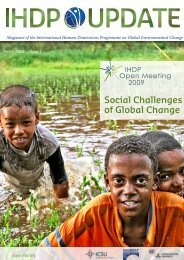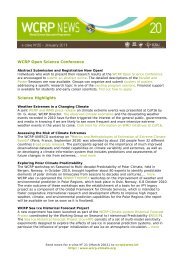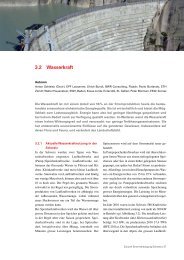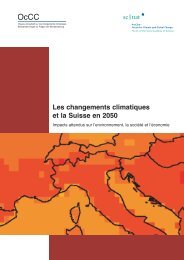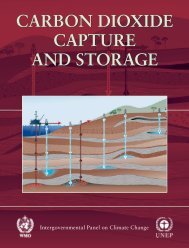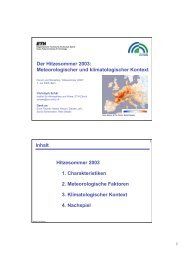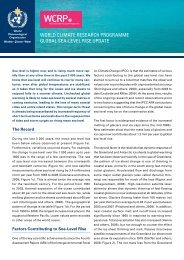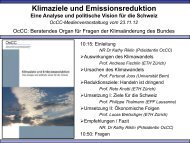Climate Change and Switzerland 2050 - OcCC - SCNAT
Climate Change and Switzerland 2050 - OcCC - SCNAT
Climate Change and Switzerland 2050 - OcCC - SCNAT
You also want an ePaper? Increase the reach of your titles
YUMPU automatically turns print PDFs into web optimized ePapers that Google loves.
<strong>Climate</strong> <strong>Change</strong> <strong>and</strong> Switzerl<strong>and</strong> <strong>2050</strong> | Synthesis 153<br />
Synthesis<br />
1. Introduction<br />
How will global climate change affect Switzerl<strong>and</strong><br />
in the year <strong>2050</strong>? Although nobody knows the<br />
future, scientifically based estimates of probable<br />
developments allow us to consider smart adaptation<br />
strategies early <strong>and</strong> make anticipatory decisions.<br />
After having concretely described <strong>and</strong> discussed<br />
the expected changes in individual sectors<br />
in the previous chapters, this chapter will consolidate<br />
these reflections <strong>and</strong> draw conclusions.<br />
We comment on the following questions from<br />
the perspective of five topics – Creeping changes,<br />
extreme events, water, space, <strong>and</strong> changes for<br />
humans:<br />
• What changes await us <strong>and</strong> why are they<br />
important?<br />
• Which adaptations are already observable?<br />
Are they advisable against the background of<br />
the overall problem or do they represent only<br />
superficial or even counterproductive pseudosolutions?<br />
• What does this mean for a comprehensive <strong>and</strong><br />
responsible climate strategy?<br />
As humans we are integrated at one <strong>and</strong> the<br />
same time into the material <strong>and</strong> energy-related<br />
cause <strong>and</strong> effect relationships of the material<br />
world <strong>and</strong> into those of a societal nature. This<br />
integration expresses itself in many ways. Thus,<br />
the development of techniques for the exploitation<br />
of fossil energy sources has set in motion<br />
not only a long-term change in economic <strong>and</strong><br />
social but also in climate <strong>and</strong> ecological systems<br />
– changes which in turn have repercussions for<br />
us humans <strong>and</strong> dem<strong>and</strong> from us adaptation <strong>and</strong><br />
problem solving.<br />
We know that the most important contribution<br />
to solving the problem of climate change<br />
consists of drastically reducing the global emission<br />
of greenhouse gases. This solution, which<br />
approaches the problem from its cause, is called<br />
mitigation. There is no alternative to this! The<br />
nature of the climate system is such that it<br />
dem<strong>and</strong>s drastic emission reductions, which<br />
will be difficult for us to achieve due to their<br />
radical nature. Thus, for the time being, it is still<br />
uncertain, when <strong>and</strong> how we will succeed in taking<br />
the necessary large steps in reduction. It is<br />
certain, however, that even in the case of quick<br />
successes in mitigation, climate change will proceed<br />
in the coming decades, due to the increase<br />
in greenhouse gas concentrations in the atmosphere<br />
(delayed consequences) caused by human<br />
activity. Therefore, we need to prepare simultaneously<br />
for local <strong>and</strong> regional restrictions due<br />
to climate change. An ideal adaptation strategy<br />
includes the greatest possible minimisation of<br />
the expected damage <strong>and</strong> at the same time the<br />
maximum utilisation of the resulting opportunities.<br />
This damage-limiting strategy is called<br />
adaptation. This report focuses on the impact of<br />
climate change around <strong>2050</strong> <strong>and</strong> the question<br />
of what kinds of adaptation Switzerl<strong>and</strong> has<br />
to achieve in addition to the urgently needed<br />
efforts in the area of mitigation.<br />
The statements made in this report in relation<br />
to the expected mean changes in the climate system,<br />
as well as their impact on society, the economy<br />
<strong>and</strong> ecosystems do not sound particularly<br />
dramatic, in part because most of them are likely<br />
to be within the range of natural variability in<br />
our latitudes around <strong>2050</strong>. In most cases, society<br />
can react to them with appropriate adaptation<br />
measures. This circumstance must not obscure<br />
the fact that our actions today will determine the<br />
future of the climate, <strong>and</strong> the massive economic<br />
<strong>and</strong> social costs associated with it after <strong>2050</strong>.<br />
Between <strong>2050</strong> <strong>and</strong> 2100, the effects of climate<br />
change will be extremely noticeable <strong>and</strong> cause<br />
great damage in Switzerl<strong>and</strong>, as elsewhere. Then<br />
the consequences for Switzerl<strong>and</strong> will be far<br />
more drastic than presented in this report. That<br />
is why immediate action in the areas of mitigation<br />
<strong>and</strong> adaptation is now becoming urgent.





